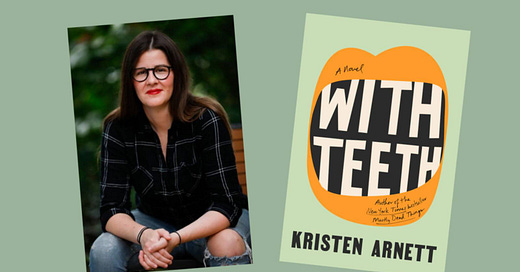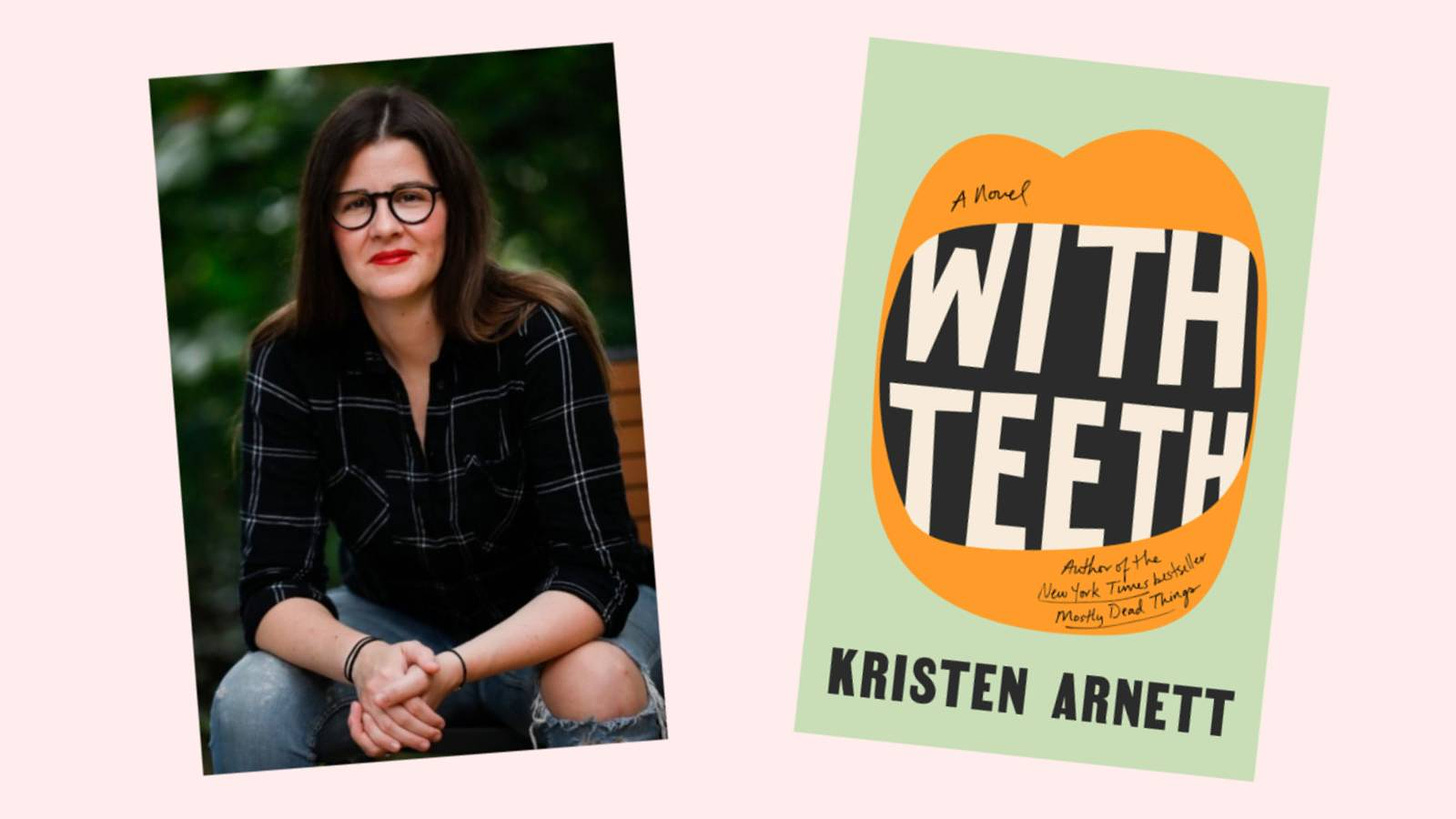This is the Sunday Edition of Paging Dr. Lesbian. If you like this type of thing, subscribe!
This week I had the absolute pleasure of speaking with Kristen Arnett, a writer, librarian, and distinguished lesbian Floridian. Kristen has published two novels, Mostly Dead Things, which follows a grieving taxidermist, and her most recent book, With Teeth, which follows a lesbian mom and her uncomfortable, tumultuous relationship with her son and wife. Her first book, Felt in the Jaw, is a short story collection that was published in 2017.
I spoke with Kristen about how likeability can be a trap, the appeal of messiness, flexible representation, and queer failure. Kristen also shares some of her recommendations for other queer writing you should check out. Please enjoy!
I know you love to interact with readers online; encouraging people to tag you in photos of them reading your books, particularly when beer is involved. When do you switch from thinking about the story in an insular way to thinking about how people might read or enjoy it after the fact?
I'll be perfectly honest, I am really in my own head whenever I am working. I kind of have to forget the outside world is there or else a project won't get done, maybe not even get off the ground! It's me just putting my head down and kind of trying to drag the story kicking and screaming out of my brain. It's a solo process, one that requires me to sit with a lot of questions and discomfort, and it's super necessary. Whenever that draft is done, the initial rounds of editing, the reading it aloud to myself and my dog, the editing AGAIN, then over to my publisher for a look - once it's out of my hands, then I start to think a little bit about readers. because I'm of the firm opinion that once my book is written, it doesn't belong to me anymore, it belongs to everyone else. If I have to sit and wonder what people might think of it when I am writing it, my head would just get way too noisy. Too many cooks, maybe that's the best way to put it. I'm always so excited when people connect to my work, but I never fully expect that to be the case. I feel very lucky to have readers! It's fun to see people with my work, exciting to see them interact with it, but I really can never think of any of that until well after the work is done.
What made you want to explore motherhood in With Teeth, particularly lesbian or queer motherhood, and all its attendant baggage?
I really wanted to write a book about lesbian mothers in Central Florida, particularly about a mother who wasn't... well, wasn't great at it. The idea that since Florida is a red state, very conservative, means that you have people looking at these two mothers and basically waiting for them to fail. The other side of that coin is the other queer people who want to have children, the idea that if you do screw up that you're ruining it for everyone else. That's a lot of pressure for a person to handle, especially when motherhood is already such a huge challenge on its own. Central Florida has a ton of queer people, but not necessarily a ton of queer spaces. There are some bars and clubs, but that's about it. Single, young adult life stuff. This book looks at what it means to be a queer person, come out, create your own found family, but then because you decide to get married and raise a child... what if that community is no longer there? What would that loss and loneliness look like? Especially if there aren't any kinds of models to look at for what you're doing. No other queer families around you to mentor you, shape things. I wanted to write a book about gay moms screwing things up. That feels deeply human to me.
Your main characters, both in With Teeth and Mostly Dead Things, tend to be, shall we say, difficult individuals – prickly people who are fairly bad at functioning as adult humans at times. Do you think about this distinction between “likable” and “unlikeable” characters while writing (ie. disrupting or troubling this notion in some way), or is this just a type of character you’re naturally drawn to?
I tend to steer clear of the idea of likeability. It's too hard to think of people that way because nobody is completely likable 24/7. In books, we're sitting so closely with characters, way closer than we get to any other real life person. We get to dive down into their brains, see all the gross stuff that lives below the surface. I am mostly interested in the messes people make. For sure, that makes more compelling fiction - it thrives on conflict - but it also means that we're allowing our characters to be REAL. People don't exist in binary spaces. Everyone lives in the gray, mucky mess, for the most part. And I love that!
Speaking of “likable” or “unlikeable” characters, do you see yourself at all as a part of this discussion about queer representation and a foregrounding of identity, not only in literature but in media more broadly? Do you think the apparent “goodness” or relatability of a character is a relevant topic when considering how a particular work exists as "representation"?
Instead of goodness or any kind of moral indicator of acceptableness, I've been trying to think of how I approach queerness in my work more in terms of possibility - the idea that the boundary is porous instead of rigid and that it's constantly shifting and expanding. My biggest thing with myself is that I feel like I never really know anything, ever, and that when I do feel like I finally have a grasp on something, that's when it finally changes and I realize that I don't actually know what I think about it! I think whenever I stop learning that way that I'll probably stop writing, because the most important part of art to me is the surprise of it. Representation should be just as flexible as we are. It should stay very human, I think.
Are there are any queer or lesbian-centric books (besides your own, of course), that you would recommend to my readers? Any other projects you want to give a shout-out to?
Oh wow, yes! There are so many great queer books out right now! Long Live the Tribe of Fatherless Girls by T Kira Madden is a favorite, as well as Torrey Peters Detransition, Baby. Love Alex Chee's Edinburgh, Bryan Washington's Lot & Memorial, as well as Pizza Girl by Jean Kyoung Frazier. The Very Nice Box just came out a few months ago, and that is very very gay and very very good! Coming up for myself, I'm working on my short fiction collection with Riverhead and I'm trying to put together another novel, so that's been fun. Starting in August, I'll have a monthly recurring column out with Catapult about Dad Culture. Lots of fun stuff is coming up! Excited for everything!
You can follow Kristen on Twitter and buy her books on Bookshop or at your local independent bookstore.





